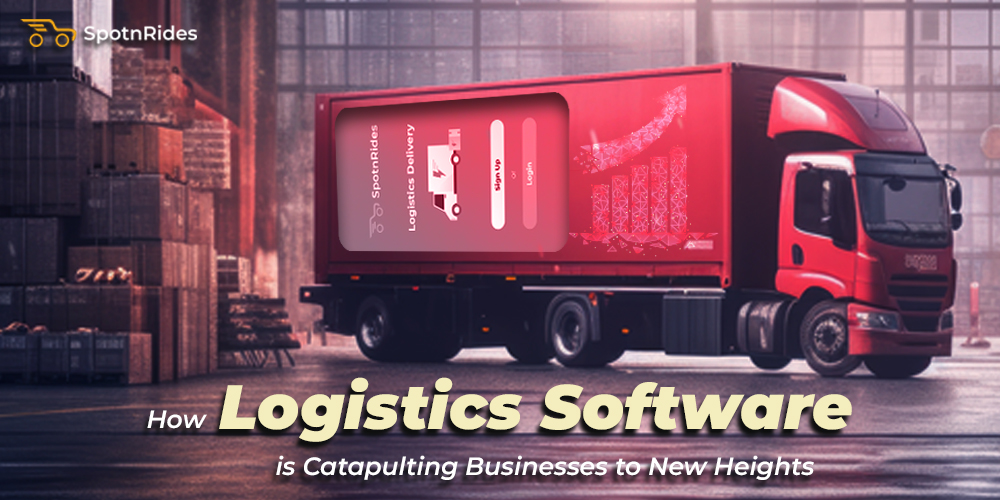
How Logistics Software is Catapulting Businesses to New Heights
In modern business, the role of logistics has evolved significantly. The integration of advanced technology has revolutionized the way of supply chain handling. The key player in this transformation is logistics delivery software. Additionally, efficient logistics contribute to a streamlined supply chain and optimize the process. As a result, they result in the growth of the business.
The global retail logistics market was at USD 246.85 billion in 2022. And is expected to grow at a compound annual growth rate (CAGR) of 12.5% from 2023 to 2030. This article is about the logistics business and the role of software in it.
Evolution of Logistics Software
Manual tracking is a cumbersome process in logistics management. As a result of the evolution of software streamlines operations and enhances efficiency. Furthermore, from simple tracking tools to sophisticated systems, the progression has been monumental. In contemporary landscape, the software goes beyond mere coordination and makes business simple. It’s a strategic asset that businesses leverage for a competitive edge.
Business tracking and assertive tracking make the business safe and credible. The logistics delivery software makes the booking process simple for customers. As a result it, enhances the experience.
Different Businesses that Depend on the Logistics Industry
The logistics industry is the backbone of various sectors, influencing diverse businesses.
E-commerce giants rely on seamless supply chains. Timely and reliable delivery services are critical for customer satisfaction and retention.
Manufacturing industries optimize production with efficient logistics. Furthermore, to ensure the timely delivery of raw materials to production, planning is essential. Moreover, efficient distribution of finished goods is vital for maintaining supply chains.
The healthcare field depends on precise logistics for timely and safe transportation. supplies like equipment and pharmaceuticals are transported. Temperature-sensitive transportation may be required for certain medical products.
The food and beverage industry relies on logistics to deliver fresh produce and perishable goods to consumers. Cold chain logistics may be necessary for maintaining the quality of certain food items.
The automotive industry depends on logistics to transport vehicle parts to manufacturing plants. Finished vehicles are transported to dealerships or consumers through a well-organized logistics network.
Retail logistics are important to restock inventory. Manage the supply chain and ensure availability on store or online platforms. Efficient delivery options contribute to a positive customer experience.
The construction industry relies on logistics for the delivery of construction materials and equipment to project sites. Additionally, proper coordination of transportation is essential to keeping construction projects on schedule.
Key Features of Logistics Delivery Software
The effectiveness of logistics software lies in its features.
Real-time tracking logistics deal with shipments and transportation. Real-time tracking can help the business and make the customer feel reliable.
Route optimization is a major problem in the logistics business. Fuel consumption can be a headache for businesses. Logistics delivery software can help in planning the route reduce fuel consumption, and avoid empty returns.
Integration with the supply chain is the quality of the software. All transportation fills the supply chain of many businesses and customers evenly.
Data analytics are some of the key features that elevate these systems. The flow rate of the business can be monitored and prior actions can be taken.
Businesses seek software that not only meets their current needs but also anticipates future challenges. A comprehensive package of features ensures adaptability and resilience in logistics.
Considerations
Implementing logistics delivery software has certain considerations.
- Integration with existing systems
- Employee training
- Potential disruptions during the transition phase are common hurdles.
Businesses need to consider this as a robust plan to mitigate risks. A well-thought-out strategy ensures a smooth transition, minimizing downtime and maximizing the benefits of the new software.
Benefits of Logistics Delivery Software for Businesses
The adoption of logistics delivery software brings a myriad of benefits to businesses.
- Enhanced efficiency
- Cost savings
- Improved customer satisfaction
- Data-driven decision-making is among the advantages.
Businesses that invest in cutting-edge logistics delivery software gain a competitive edge in the market. This software helps in adapting to changing industry dynamics.
User Experience
The user experience is a critical aspect of logistics software implementation. Moreover, a user-friendly interface, intuitive design, and responsive support contribute to a positive user experience. Additionally, seamless integration into existing workflows ensures that employees can harness the full potential of the software without facing steep learning curves. Ultimately, a positive user experience enhances productivity and encourages widespread adoption of organizations.
Conclusion
The evolution of logistics software has redefined the way businesses approach supply chain management. Consequently, the dynamic nature of the logistics industry demands adaptable solutions. In response, logistics delivery software emerges as the answer. Furthermore, to address this need, businesses should develop logistics software to meet their specific business requirements. Additionally, by strategically integrating key features at SpotnRides, businesses can unlock the full potential of logistics delivery software. Consequently, this paves the way for a future of streamlined operations and sustained success.
